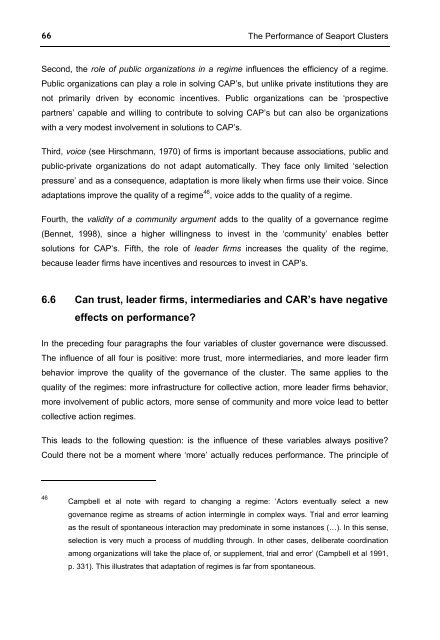The Performance of Seaport Clusters - RePub - Erasmus Universiteit ...
The Performance of Seaport Clusters - RePub - Erasmus Universiteit ...
The Performance of Seaport Clusters - RePub - Erasmus Universiteit ...
You also want an ePaper? Increase the reach of your titles
YUMPU automatically turns print PDFs into web optimized ePapers that Google loves.
66<br />
<strong>The</strong> <strong>Performance</strong> <strong>of</strong> <strong>Seaport</strong> <strong>Clusters</strong><br />
Second, the role <strong>of</strong> public organizations in a regime influences the efficiency <strong>of</strong> a regime.<br />
Public organizations can play a role in solving CAP’s, but unlike private institutions they are<br />
not primarily driven by economic incentives. Public organizations can be ‘prospective<br />
partners’ capable and willing to contribute to solving CAP’s but can also be organizations<br />
with a very modest involvement in solutions to CAP’s.<br />
Third, voice (see Hirschmann, 1970) <strong>of</strong> firms is important because associations, public and<br />
public-private organizations do not adapt automatically. <strong>The</strong>y face only limited ‘selection<br />
pressure’ and as a consequence, adaptation is more likely when firms use their voice. Since<br />
adaptations improve the quality <strong>of</strong> a regime 46 , voice adds to the quality <strong>of</strong> a regime.<br />
Fourth, the validity <strong>of</strong> a community argument adds to the quality <strong>of</strong> a governance regime<br />
(Bennet, 1998), since a higher willingness to invest in the ‘community’ enables better<br />
solutions for CAP‘s. Fifth, the role <strong>of</strong> leader firms increases the quality <strong>of</strong> the regime,<br />
because leader firms have incentives and resources to invest in CAP’s.<br />
6.6 Can trust, leader firms, intermediaries and CAR’s have negative<br />
effects on performance?<br />
In the preceding four paragraphs the four variables <strong>of</strong> cluster governance were discussed.<br />
<strong>The</strong> influence <strong>of</strong> all four is positive: more trust, more intermediaries, and more leader firm<br />
behavior improve the quality <strong>of</strong> the governance <strong>of</strong> the cluster. <strong>The</strong> same applies to the<br />
quality <strong>of</strong> the regimes: more infrastructure for collective action, more leader firms behavior,<br />
more involvement <strong>of</strong> public actors, more sense <strong>of</strong> community and more voice lead to better<br />
collective action regimes.<br />
This leads to the following question: is the influence <strong>of</strong> these variables always positive?<br />
Could there not be a moment where ‘more’ actually reduces performance. <strong>The</strong> principle <strong>of</strong><br />
46 Campbell et al note with regard to changing a regime: ‘Actors eventually select a new<br />
governance regime as streams <strong>of</strong> action intermingle in complex ways. Trial and error learning<br />
as the result <strong>of</strong> spontaneous interaction may predominate in some instances (…). In this sense,<br />
selection is very much a process <strong>of</strong> muddling through. In other cases, deliberate coordination<br />
among organizations will take the place <strong>of</strong>, or supplement, trial and error’ (Campbell et al 1991,<br />
p. 331). This illustrates that adaptation <strong>of</strong> regimes is far from spontaneous.

















